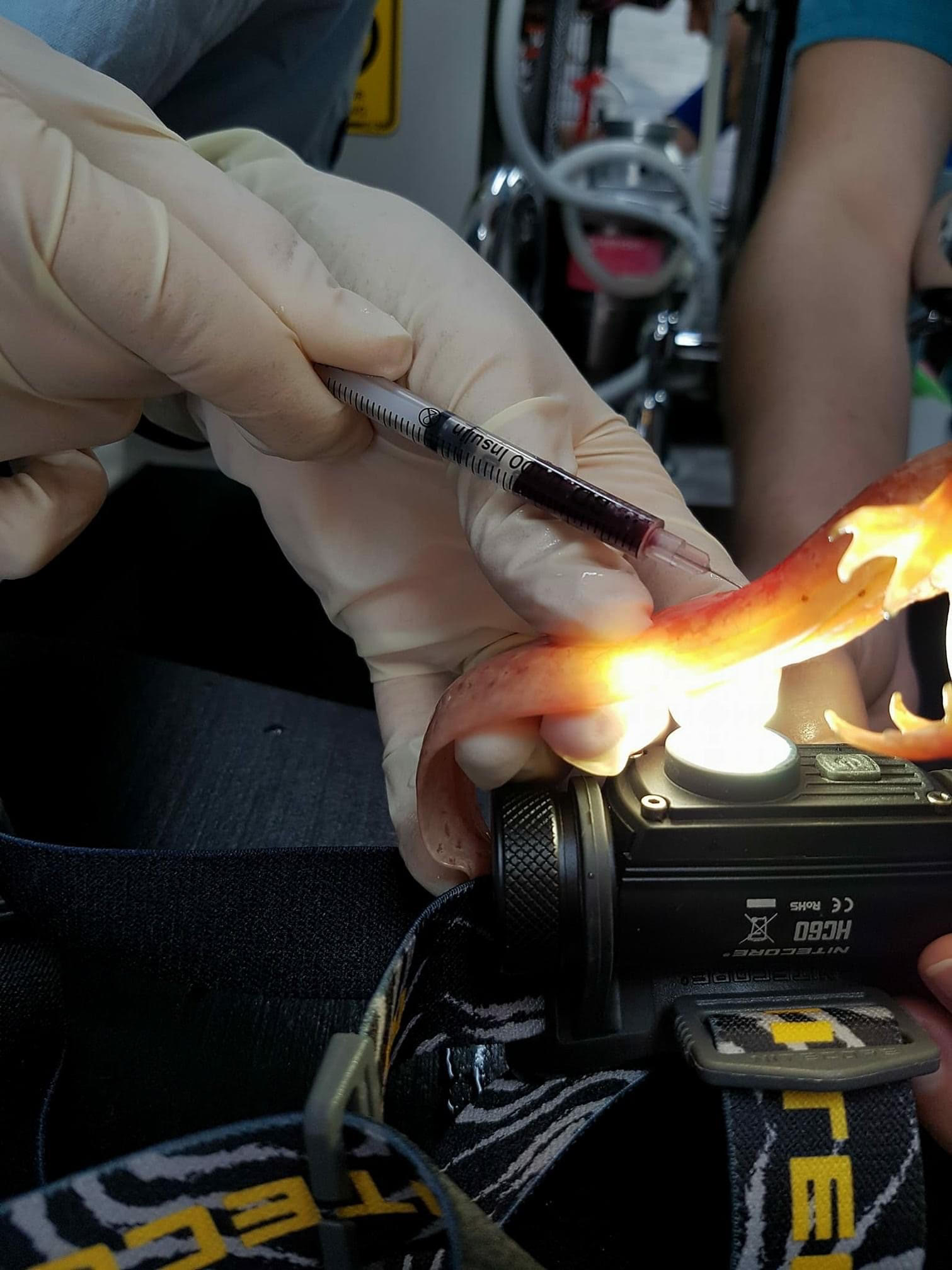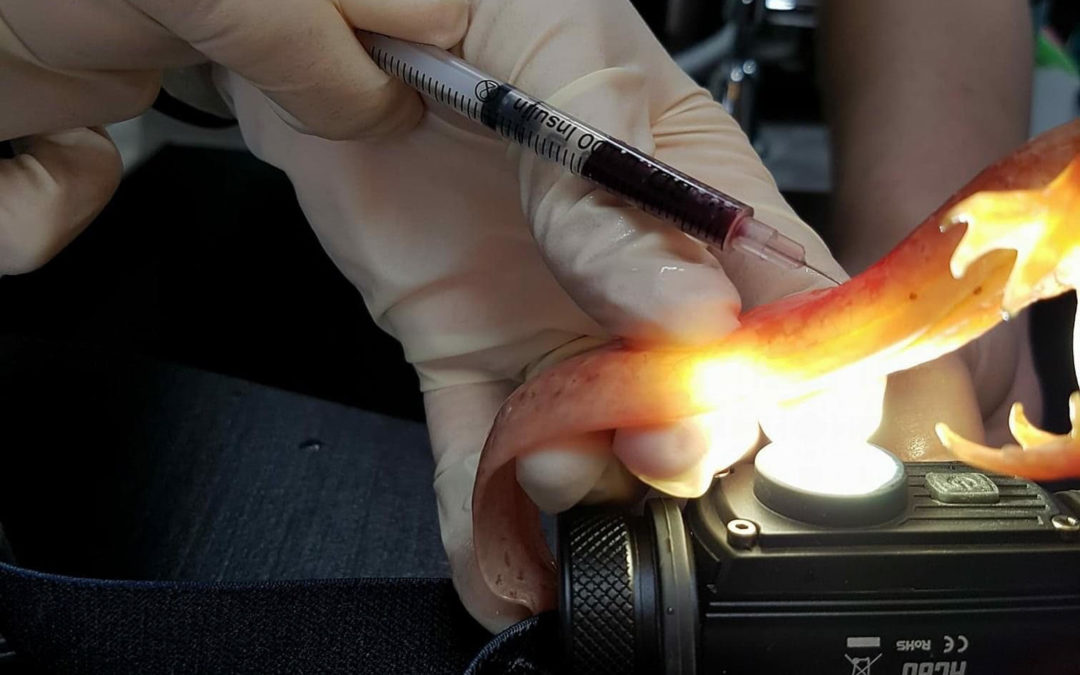To continue our monthly theme of Avian and Exotic diagnostic tests today we wanted to talk to you about the various blood tests we can do for the creatures that we see. We routinely collect blood from all of the creatures that walk, slither and fly through our door – from fish and tiny birds up to large monitors and amphibians! There are many different blood tests, giving us different information, and what we recommend will vary from case to case. We will often suggest blood tests as part of health checks so that we can combine our external physical examination with an assessment of internal health. ‘Well’ blood tests can also establish a ‘normal’ set of values for your pet, making it is easier to pick up on what is abnormal if they become unwell.
Common blood tests include:

We can take blood from all sorts of creatures. Here is Dr Kim taking blood from an Axolotl. The light illuminates the blood vessel making it easier to spot!
DNA sexing:
This is a blood test offered to birds to tell you if your bird is male or female! Some bird species are sexually monomorphic (both sexes are similar to the human eye). Knowing gender can be important when trying to plan for things like egg laying or getting friends for your bird. For some of our clients, knowing sex is important for choosing the right name, too! It only requires a small sample of blood that we send away to the laboratory. Results can take 3 – 4 weeks to return.
This test for the disease ‘Psittacosis’ is in fact NOT a blood test, but instead involves a swab being taken of the eye, mouth and cloaca. It is then sent to the lab for testing. This test is to look specifically for avian chlamydia or psittacosis. Psittacosis is a disease caused by the bacteria Chlamydia psittaci and has also been called chlamydiosis, chlamydia, ornithosis or parrot fever, and is a common cause of illness in many bird species. Infection is mainly transmitted via inhalation or ingestion of contaminated dust from feathers or droppings of infected birds. Close contact and poor ventilation increase the risk of infection. Additionally, physiological stress increases both susceptibility to the disease and the amount of infection shed by infected birds. Some actively infected birds may be carriers for the disease, and show no clinical signs at all. These birds may appear healthy until subjected to a stressful incident, and then become ill. Clinical signs of infection tend to be breathing problems, diarrhoea or lime-green urates. Other symptoms include poor appetite, weight loss, being fluffed and disinterested in the surroundings, and nasal or ocular discharge. Unfortunately, these signs are not specific for this disease, and may indicate other illness. It is important to seek veterinary advice if you notice these symptoms in your bird, as Psittacosis left untreated can be fatal. Young birds are more susceptible than adult birds. Chlamydia psittaci can be transmitted from birds to people, although it is rare. Human infections are more common in the elderly, pregnant, sick or very young, or immunocompromised patients (chemotherapy, transplant, HIV patients, etc). Asthmatic people may also be at an increased risk.
We advise that every bird is tested for psittacosis, given the risk to human health. If your bird has been tested and is negative, and has no exposure to other birds (or only exposure to other negative birds) they shouldn’t contract the disease. Most reputable boarding facilities will require birds to have had a negative psittacosis test in the last 12 months prior to the visit.
Haematology
The haematology or complete blood count (CBC) looks at the red blood cell count, protein level and white blood cell count. It allows us to look for things like anaemia (low red blood cells), check blood protein levels, and assess the white blood cell count. Changes in the white blood cell count, and the appearance of white cells, can indicate the presence and severity of infection. Blood cancers and blood parasites can also be detected.
Ideally we would do a haematology test annually on all of our patients, as changes to these parameters can occur earlier on in a disease process. It is also very useful if a patient ever does get sick to have a set of ‘normal’ values specific to them. By doing annual haematology assessment, we are able to have this ‘normal’ set for your pet and can often pick up on subtle changes more quickly.
Biochemistry
A biochemistry test examines organ function. We can do some parameters in house, but usually send the sample to an external laboratory that can run a full panel. A complete test assess blood sugar levels, liver and kidney function, liver inflammation, pancreatic and gut inflammation, blood fats, and calcium levels. All of this information together gives us a great insight into the metabolic function of your pet.
Blood tests are a great way to give us a full picture on how your pet is doing physically. They allow us to pick up on disease before your pet appears unwell, allowing us to get on top of treatments quickly. If you have any questions about blood tests feel free to ask the veterinarian during your appointment.
There are many other, specific tests that we do when they are indicated. Your veterinarian is happy to discuss these with you.




